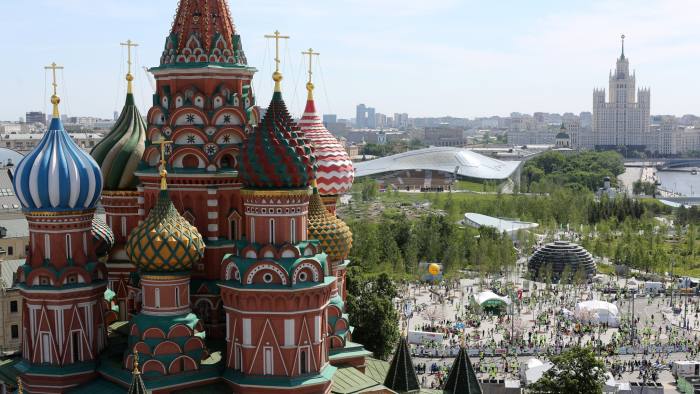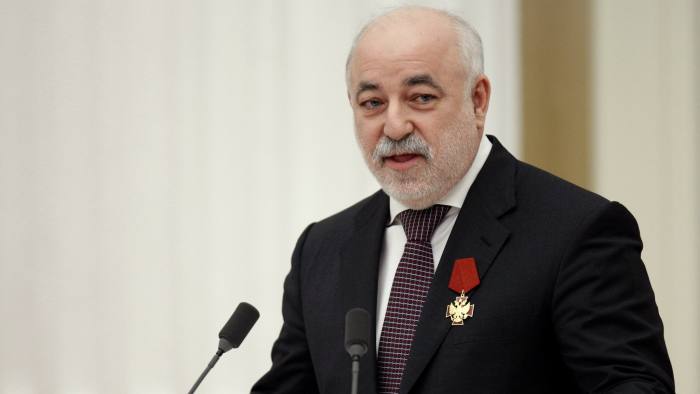Sanctions reach far beyond Russia’s oligarchs
Struggles for mid-size groups illustrate broader effects of US and EU penalties
Henry Foy

The harshest curbs against Russia were designed to totally sever targets from the international banking system © Bloomberg
When officials at the US Treasury were mulling which Russians they should hit with sanctions to punish Moscow for its alleged meddling in the 2016 US election, it is unlikely that GV Gold featured in their conversations.
A mid-ranking gold producer that has spent two decades slowly building up a foothold in the country’s vast mining industry, it is not owned by oligarchs and has no major political connections. In many ways, it is an example of an enterprise that critics of Russia’s economy often say does not exist in a country portrayed as being dominated by kleptocrats, state-controlled behemoths and shady tycoons with friends in high places.
It has nevertheless become an unwitting victim of a western sanctions regime now entering its fifth year, and a prime example of the collateral damage inflicted across vast swaths of the economy. “The company is nothing to do with all this. But it is their reality all the same,” said a person close to GV Gold’s management. “But what can you do?”
First levied in 2014 after Moscow’s annexation of Crimea, US and EU sanctions cut off some major Russian energy and defence companies from certain western technologies and long-term financing. Various new restrictions have been introduced in the years since, but the harshest curbs, levied in April of this year, were designed to totally sever the targets from the international banking system. The broadside had immediate, powerful effects. A small group of oligarchs lost $7.5bn in four days. Most prominently, metals and energy tycoon Oleg Deripaska saw the value of his aluminium businesses, Rusal and EN+, plummet.
But as GV Gold’s experience shows, the real impact has been felt far wider. The sanctions could not have come at a worse time. The company was days from announcing a deal to acquire a rival, Kamchatka Gold — an acquisition that had been worked on for almost 12 months and was set to roughly double its size. The catch was that Kamchatka was ultimately owned by Viktor Vekselberg, an oligarch who was hit by the same sanctions as Mr Deripaska. The deal was ripped up.
At the same time, the pall that the sanctions cast over the Russian investment climate forced GV Gold to postpone an initial public offering. “The market, due to the change in the geopolitical situation and the blowback from the sanctions list, simply closed for small-sized, low liquidity IPOs,” said a person briefed on the company’s strategy. “Theoretically they are ready for a listing at two months’ notice. But this is not a near-term likelihood.”

GV Gold’s deal to buy rival Kamchatka was shelved as the group was ultimately owned oligarch Viktor Vekselberg © Reuters
GV Gold is not alone. IBS, an IT services provider, had already announced its IPO when the sanctions were announced, forcing it to postpone the plans. Moscow bankers say only the bold or the desperate would push ahead with listings in the current climate. That leaves companies such as GV Gold and IBS in a bind. The gold producer, which is 18 per cent-owned by US fund manager BlackRock, has increased its production by some 35 per cent over the past two years to become Russia’s seventh-largest, but reckons organic growth will flatten from next year.
Based in Russia’s Far East, a 2017 stake sale and the IPO plans pegged its value at $650m-$750m. Longstanding shareholders who have built the company over two decades are looking to cash out. Small-scale acquisitions of other Russian gold assets are being considered, two people involved in the talks told the Financial Times, as the company attempts to gain scale that would allow it to compete with the country’s two market leaders, Polyus and Polymetal.
Short of that, the people said that an option to sell the entire company to one of those major players was not completely out of the question, given the market conditions. “It’s not plan A, but maybe plan D or E,” said one of the people.
In contrast to that uncertainty, sectors directly targeted by sanctions are powering ahead. Russia’s oil and gas output is at a 30-year high, gas exports to Europe are at record levels, and the oil and gas index on the Moscow stock exchange has never been higher. Mr Deripaska’s companies are negotiating with Washington for some form of waiver to allow it to continue doing business. Prominent oligarchs and political figures may be the headline victims, but look to the broader damage on Russia’s mid-sized companies to see the long-term effect.
0 comments:
Publicar un comentario